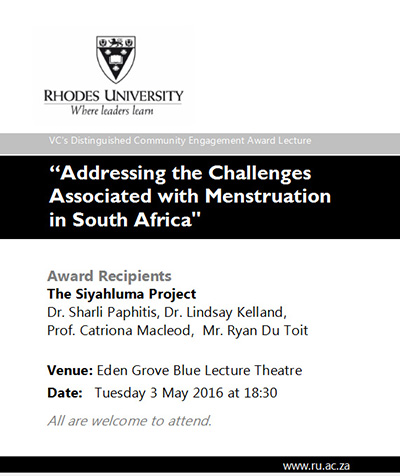
Title: ‘The Siyahluma Project: Addressing the Challenges Associated with Menstruation in South Africa’
Presenters: Sharli Paphitis, Lindsay Kelland, Catriona Macleod and Ryan Du Toit
Venue: Eden Grove Blue Lecture Theatre
Date: Tuesday 03 May at 18h30
All Welcome!
Siyahluma—‘We are growing’—is a multi-pronged, multi-stakeholder project that aims to make sense of and address the various menstruation-related challenges facing women in South Africa—most notably a lack of access to (1) reliable and hygienic menstrual products with which to manage menstruation, as well as (2) the information needed to understand the process of menstruation, how to manage menstruation and how to perceive and treat menstruating bodies given that menstruation is surrounded by a culture of taboo and silence. This lack of access to information, or in many cases, the provision of false, misleading or stigmatised information about menstruation has a severe and negative impact on the management of menstruation for both young girls and women globally, and particularly in the South African context.
In this presentation, we describe in some detail the various aspects of the project—including interdisciplinary research, critical health education interventions, and a sustainable community-based social enterprise that produces reusable sanitary kits and distributes these free of charge or at minimal cost to those who need and want them. All three aspects of the Siyahluma project aim to alleviate the menstruation-related challenges facing girls and women in our community. In describing these different aspects we hope to show how each is intimately connected to the rest, such that all aspects of the larger project speak to and draw upon one another. We also hope to highlight some of the pragmatic and methodological steps we have taken while attempting to fulfil the various objectives of the research, educational interventions, and social enterprise, focusing particularly on the partnerships that have been formed over the three years that the project has been running in order to address the challenges identified. After describing the work that has already been done, we will briefly turn to the future of the project and the exciting directions in which all three aspects are moving.
